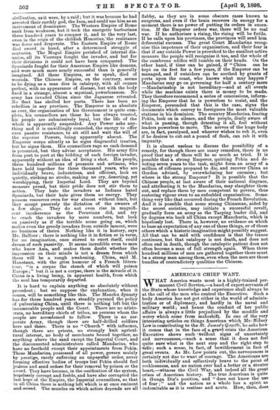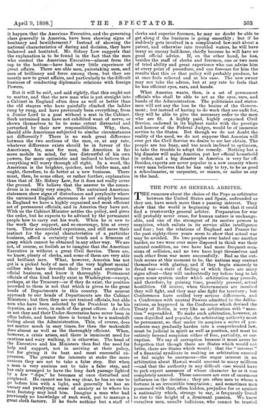AMERICA'S CHIEF WANT.
WHAT America wants most is a highly-trained per- manent Civil Service,—a band of expert servants of the State whose knowledge and experience shall always be at the call of the men who control the Executive. Such a body America has not got either in the world of adminis- tration or of diplomacy, and hardly in the naval and military world; and hence the conduct of her public affairs is always a: little prejudiced by the muddle and worry which come from makeshift. In one of the very interesting articles on things American which Mr; Sidney Low is contributing to the St. James's Qazette, he asks how it comes that in the face of a. gravg crisis the American Executive shows such -tvident signs of uncertainty and nervousness,—such a sense that it does not feel quite sure what is the next step and the right step to take; such a sense, in fact, of bewilderment in face of great events. As Mr. Low points out, tha nervousness is certainly not due to want of courage. T,he Americans are both individually and collectively brave to the point of recklessness, and no nation ever had a better or a stouter heart,—witness the Civil War, and ingeed all the great crises of American history. The true American is quite in Gunga Din's position, and "does not know the use of fear ; " and the nation as a whole has a spirit as -indomitable as it is restless and acute. How, then, does it happen that the American Executive, and the governing class generally in America, have been showing signs of hesitancy and bewilderment ? Instead of showing the national characteristics of daring and decision, they have balanced and hesitated. Mr. Sidney Low suggests that the explanation is to be found in the fact that the men who control the American Executive—almost from the top to the bottom—have had very little experience of great affairs. There are able men, painstaking men, and men of brilliancy and force among them, but they are mostly new to great affairs, and particularly to the difficult business of conducting diplomatic relations with foreign Powers.
But it will be said, and said rightly, that this ought not to matter, and that the new man who is put straight into a Cabinet in England often does as well or better than the old stagers who have painfully climbed the ladder rung by rung, and have previously been everything, from a Junior Lord to a post without a seat in the Cabinet. Such untrained men have not exhibited want of nerve, or shown themselves to be to some extent distracted and perturbed by their new responsibilities. Why, then, should able Americans subjected to similar circumstances act differently ? There is no such great difference between the two sections of the race, or, at any rate, whatever difference exists should be in favour of the Americans, for, man for man, the American is far more mobile in mind, far less distrustful of his own powers, far more optimistic and inclined to believe that everything will worry through all right. In a word, the American is the brighter, quicker, and bolder man, and ought, therefore, to do better at a new business. There must, then, be some other, or rather further, explanation than that of Mr. Sidney Low, for it does not really cover the ground. We believe that the answer to the conun- drum is in reality very simple. The untrained American statesmen show signs of disturbance and perplexity where the untrained English statesmen do not simply because in England we have a highly organised and most efficient set of permanent officials, and in America they have not. With us the Cabinet Minister settles the policy, and gives the order, but he expects to be advised by the permanent people how to carry out his work. When he is new to the work they support, and so encourage, him at every turn. Their accumulated experience, and still more their instinct for the special characteristics of a particular business, afford a certainty of touch and a firmness of grasp which cannot be obtained in any other way. We are not, of course, so foolish as to imagine that the American Executive is without a great Civil Service. There are, we know, plenty of clerks, and some of them are very able and brilliant men. What, however, America has not got is a picked body of men of the very highest mental calibre who have devoted their lives and energies to official business, and know it thoroughly. Permanent officials of this kind hardly exist in Washington—except, perhaps, at the Treasury—or if they do exist, the position accorded to them is not that which is given to the great heads of Departments in this country. The nearest approach to our heads of Departments are the Cabinet Ministers ; but then they are not trained officials, but able men who have been selected by the President to be his deputies, as it were, in each of the great offices. As often as not they and their Under-Secretaries have never been in office before, and hence there is bound to be a makeshift feeling about the Administration. This, of course, does not matter much in easy times, for then the makeshift does almost as well as the thoroughly efficient. When, however, a crisis arises, and there is imminent need for cautious and wary walking, it is otherwise. The head of the Executive and his Ministers then feel the need for help and support, not in arriving at their policy, but for giving it its best and most successful ex- pression. The greater the interests• at stake the more anxious they are not to take a false step. But when a man is very anxious not to take a false step, and has only arranged to have the long dark passage lighted by a few "dips," he becomes at once disturbed and perplexed. He cannot see his way clear, he has no one to go before him with a light, and generally he has an uneasy and paralysing sense of anxiety as to where his next. footstep may land him. Imagine a man who had Previously no knowledge of such work, put to manage a great cloth factory. If he finds nothing but a staff of clerks and superior foremen, he may no doubt be able to get along if the business is going smoothly ; but if he suddenly gets involved in a, complicated law-suit about a, patent, and otherwise into troubled waters, he will have many an uneasy half-hour, chiefly because he will have no good official advice. If, on the other hand, he has, besides the staff of clerks and foremen, one or two men of tried ability and great experience who can advise him at every point of procedure, and can forecast for him the results that this or that policy will probably produce, he at once feels relieved and. at his ease. The new owner may not take the advice, but at any rate he feels that he has efficient eyes, ears, and hands.
What America wants, then, is a set of permanent officials who shall be able to act as the eyes, ears, and hands of the Administration. The politicians and states- men will not any the less be the brains of the Govern- ment; but instead of having to do work they are unfit for, they will be able to give the necessary order to the men who are fit. A highly paid, highly organised Civil Service, endowed in its highest ranks with the prestige and honour of the Federal Judges, would be of immense service to the States. But though we do not doubt the reality of the need, we do not suppose that America will ever get the Civil Service we desire to see her obtain. The people are too busy, and too much inclined to optimism, to take the trouble to adopt the remedy. Nothing but a big disaster will make America put her official household in order, and a big disaster in America is very far off. Besides, experts are never popular in a new country where every man believes that he has only to try, to be as good a schoolmaster, or carpenter, or mason, or sailor as any in the land.



































 Previous page
Previous page